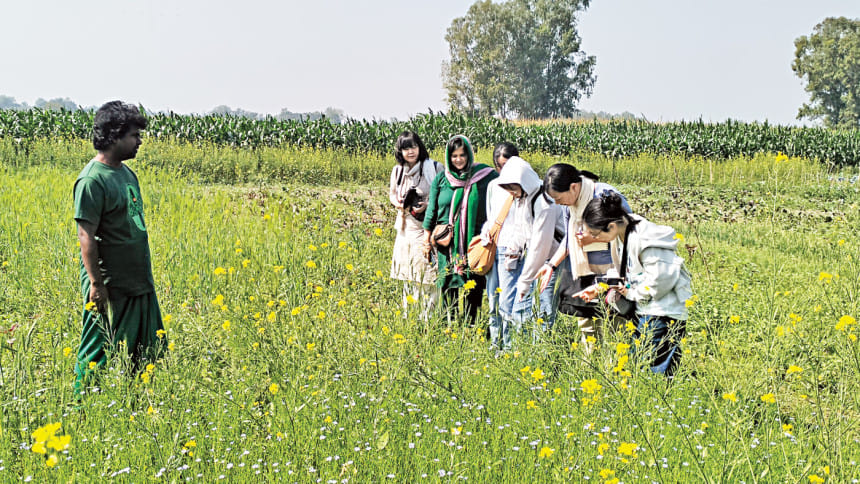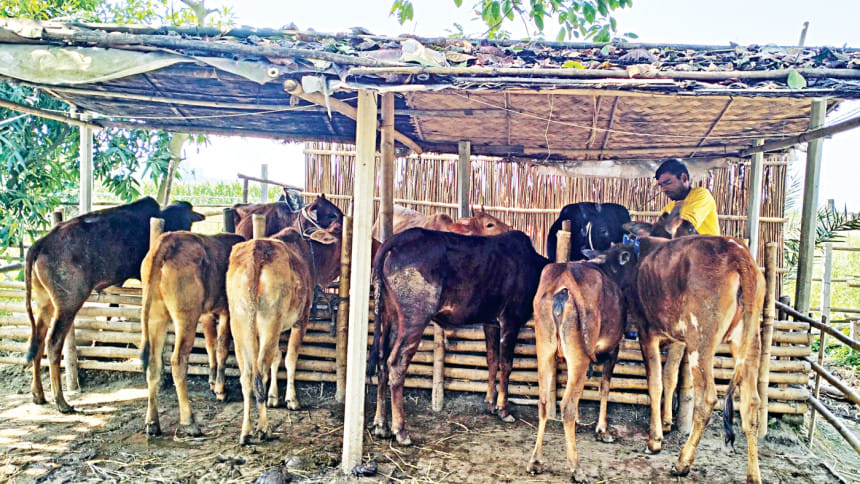The future of organic farming

Can you share your journey with Prakritik Krishi, which has been a remarkable and transformative experience?
Prakritik Krishi, an agricultural approach rooted in generational wisdom and hands-on experience, was founded in 2012 by a group of young visionaries responding to the harmful agricultural practices affecting both the environment and people's lives.
I come from a sharecropping family, a historically subaltern community that has endured generations of exploitation. My ancestors, living in villages along the southern Padma River, rebelled against indigo planters who forced them into indigo cultivation. In the ensuing conflict, they killed an indigo planter and were forced to flee their village.
I first heard this story in eighth grade while witnessing the struggles of farmers in the 1990s—rising production costs, dependence on chemical fertilisers, small loans to stay afloat, and unfair market prices. These hardships deeply shaped me, fuelling my resolve to break the cycle of exploitation so that future generations of farmers would not endure the same fate.
During this time, my path diverged from my friends. Instead of playing, I devoted myself to understanding the struggles of marginalised communities—particularly fishing and farming communities—while exploring historical sites, especially nilkuthis, which bore the imprints of past exploitation.
I realised I needed a profession that would allow me to connect deeply with people. With this in mind, I enrolled in the Mass Communication and Journalism Department at Chittagong University. During my early days there, I discovered that many of my rural peers had similar experiences—their families, too, were struggling. We often asked ourselves: how much longer will this continue? We began to organise, recognising the urgent need to understand these issues. Our families needed protection, and we had to find a way forward.

At the same time, I grew increasingly dissatisfied with the existing curriculum, believing it lacked vocational and practical relevance. This frustration led to disagreements with my teachers. However, with the support of well-wishers—mainly professors and peers—I focused on fostering alternative learning spaces.
We began organising parallel classes with like-minded individuals and initiated study circles to explore peasant uprisings and the struggles of the farming community. After graduating, I briefly worked in agro and environmental journalism from 2009 to 2011 in Dhaka, aiming to understand agricultural crises on national and global levels. However, we soon wondered whether our discussions were truly making an impact. In 2012, we chose to take action—what we advocated needed to be put into practice.
By then, we had acquired valuable experience, knowledge, and a clearer vision for addressing the agricultural crisis. We urged farmers: "Stop using chemical fertilisers! Stop pesticides! Reject company dependencies! Do your own farming!" But their lands were already degraded by chemicals, and the ecology was damaged. The question was—how could they transition? We decided to lead by example.
In 2013, we secured 36 shottangsho of land in Amtali village, Manikganj, and started our first chemical-free cultivation. Engaging with farmers, we developed an approach we called "Subaltern Communication Research"—understanding marginalised communities' challenges and co-creating solutions. In farmer meetings, the consensus was clear: natural farming was the only way to break free from corporate control. This period marked the birth of the name 'Prakritik Krishi.'
Between 2013 and 2017, we worked diligently to refine our method—restoring soil fertility, reviving biodiversity, and creating a sustainable farming ecosystem. Initially self-funded, we faced setbacks, including losing our land to river erosion in 2013. In 2014, an NGO provided land in Jhenidah to pilot organic farming. We sent one of our entrepreneurs to start farming, organise farmers, and hold regular baithaks (meetings). However, farmers remained hesitant—organic farming lacked structured production, distribution, and marketing systems to compete with chemical farming.
To address this, we opened an outlet in Lalmatia, initially showcasing our products once a week. Ensuring sales was crucial for expansion. Our first customers included acquaintances, hostels, orphanages in Mohammadpur, and the neighbourhood. With support from well-wishers, we gradually expanded our market.
As demand for organic food grew, we increased supply to twice a week. In the early days, sales were inconsistent. From our first day's sales of Tk 1,500 in 2014, we have now grown to Tk 1 lakh in wholesale transactions.

How has Prakritik Krishi sustained its growth while fostering natural farming?
To sustain ourselves, we prioritised cost recovery from the market rather than relying on external funding. Over time, we expanded to Manikganj, Araihazar, and Keraniganj, acquiring land through lending arrangements to increase production.
In 2018, we secured land in Baliakhor, Manikganj, establishing Prakritik Krishi as a long-term initiative. We conduct ongoing research and organise regular workshops and training sessions. At Prakritik Krishi Shikkhon, we host a three-day residential workshop monthly, open to all. To date, 500 participants from Bangladesh, India, and France have trained with us, and our next session will be the 49th workshop. These workshops bring together both local and international experts.
We also conduct one-day training for farmers on organic farming, covering soil quality, seasonal crops, seed varieties, eco-friendly lifestyles, and hands-on techniques. Our farm includes a seed bank with 20 indigenous rice varieties and 70 local vegetable varieties. We have expanded to four neighbouring villages, engaging 40 farmers in small-scale organic production.
Our Prakritik Krishi Biponon Kendra is thriving, with a permanent outlet on Salimullah Road and two cargo vans delivering organic produce. Farmers receive payment flexibly, either upon supply or after sales. Notably, 27 Dhaka families now practise organic farming with our support, producing their own food.
We are forming Prakritik Krishi Samaj to support farmers facing social challenges. Through Krishsanga, farmers exchange knowledge and discuss organic and hybrid practices. To combat the local seed crisis, we organise seed exchange events, as some seed prices are exorbitant.
Our greatest aspiration is to establish an open agricultural university—rooted in farming communities and organic principles—where both teachers and students will be farmers.
Could you share some of the challenges you have faced and how you have managed to cope with them?
The biggest challenge in natural farming is psychological resistance. Farmers transitioning to organic methods often face neglect, discouragement, and even ridicule from family, friends, and society. Some are labelled pagol (crazy) for refusing chemical fertilisers, while others have even faced physical abuse.
Another major challenge is the aggressive marketing tactics of chemical companies, which put organic farmers in direct conflict with industrialised agriculture. The deeply entrenched market system overwhelmingly favours chemical-based farming. Reviving soil damaged over the last 30-40 years due to chemical fertilisation remains difficult. Additionally, lack of capital makes sustaining natural farming even harder. Farmers are often victims of microcredit schemes and predatory lending, which is why we strictly avoid loans.
Market management is another obstacle, as the system is skewed towards chemical farming. At universities, agricultural curricula primarily promote chemical-based methods, and the Department of Agricultural Extension continues advocating for their use. Dealers also push chemical fertilisers onto farmers. Competing in this system is difficult—for instance, while local poultry varieties sell for around Tk 700, industrially farmed ones cost only Tk 250, making organic options less viable for consumers.
Climate change poses yet another challenge. Flash floods and rising temperatures have already led to severe crop losses. Land degradation and ecosystem collapse are accelerating at an alarming rate. Additionally, chemical fertilisers, pesticides, and hormones receive government subsidies of Tk 30-40 crore annually, while organic farming receives none, creating an uneven playing field.
Encouragingly, in the last few years, discussions around organic farming have gained traction.
What are the future prospects of natural farming that you envision?
Establishing a distinct niche is not difficult, but gaining visibility in large-scale markets remains a challenge. The fresh produce market in Bangladesh is worth Tk 1,200 crore, and organic food could capture 10-25 percent of the market as demand for healthier options grows. Health experts now advocate for organic food, providing guidelines on safe consumption.
At Prakritik Krishi, 12 dedicated individuals, including graduates, work round the clock, engaging with 500-1,000 farming families. Our success is not measured in financial profit but in the number of people benefiting from natural farming.

 For all latest news, follow The Daily Star's Google News channel.
For all latest news, follow The Daily Star's Google News channel. 



Comments